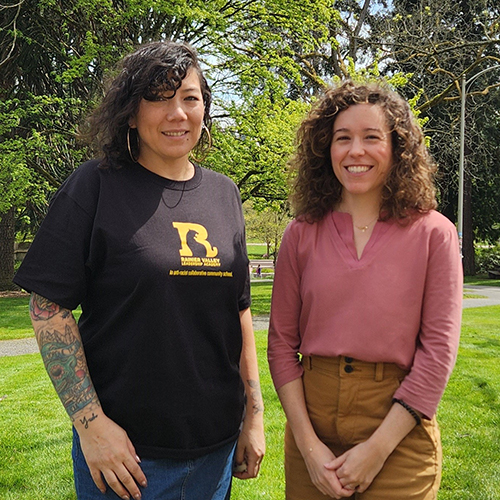Hannah Sanghee Park (2008), introduced to poetry as a UW freshman, is a 2013 recipient (along with UW alumnus Matthew Nienow) of a Ruth Lilly Poetry Fellowship. Awarded by the Poetry Foundation, publisher of Poetry magazine, the fellowship recognizes aspiring poets in the United States. The $15,000 scholarship prize is intended to encourage the further study and writing of poetry and is open to all U.S. poets between 21 and 31 years of age.

After graduating from the UW with a BA in English, Park earned an MFA from the Iowa Writers' Workshop. Her chapbook, Ode Days Ode, was published by the Catenary Press in 2011. She is the recipient of fellowships and awards from the Fulbright Program, 4Culture, the Iowa Arts Council/National Endowment for the Arts, and the MacDowell Colony. Her work is forthcoming in Best New Poets 2013 and Poetry Northwest. Park now attends the Writing for Screen & Television Program at the University of Southern California (USC) School of Cinematic Arts.
What drew you to poetry initially?
By some providence, I got to take English 283, Beginning Verse Writing, as a second-quarter freshman. I had no set idea about what I wanted to major in—all I knew was that I loved to write, and thought that law or linguistics seemed like fascinating options. But the very first poem our instructor gave us to read was James Galvin's "Cherry Blossoms Blowing in Wet, Blowing Snow." I remember being awestruck that a poem could make me feel this way, or that a poem could look like that. I wanted to have that effect on a reader. It was my first foray into contemporary poetry, and the watershed. Later that quarter, an upperclassman told me about the Iowa Writers' Workshop (where Galvin teaches). I made a goal then and there that when I graduated, I would meet and work with the poet responsible for "converting" me.
Have faculty in the UW Creative Writing Program been influential in your life and/or work?
The Creative Writing Program made me who I am today, and I'm entirely grateful for it. I burgeoned because of its academic, administrative, and financial support. I was lucky enough to be a part of its Friday Harbor and Rome programs, which are intensive, extensive approaches to writing that instilled in me the craft and discipline necessary for poetry. I highly recommend both for any writer serious about developing his/her skills. The two faculty I've worked with most—Cody Walker [now at the University of Michigan] and Richard Kenney— have been the most influential in shaping me as a person, poet, writer, thinker, and instructor, as they are inimitable people, poets, writers, thinkers, and instructors. My art and craft is all owed to them. To this day, I still keep in touch with them, because for Rick and Cody, the classroom doesn't end when the quarter (or program) does.
I took four classes with Cody (including the Friday Harbor Creative Writing seminar), the first of which was immediately after 283. If you're in a room with Cody for a few seconds, you just want to be him. I still want to be Cody when I grow up. And to be a poet, humorist, critic, and professor of his stature—well, I'd be growing up until I died.
I'm fortunate to have had Rick as a mentor in many capacities: undergraduate professor, study abroad professor, independent study and thesis advisor, and graduate professor (when he was a visiting faculty member at Iowa). He's a wellspring of knowledge and a master of verse (both sourced, seemingly endlessly, from Parnassus and Helicon). It's a testament to his teaching prowess that two students he's had (one undergrad, one grad) both won this prize; he's a legend, has legions. What he does in conversation is ignition; what he does on the board and on the page goes beyond poetry—Rick's thinking about neuroscience, music, anthropology, real life. They both deserve every teaching accolade for their singular methods and investment in their students.
What appeals to you about this particular literary form? Are there joys and challenges unique to poetry?
I like supererogation (a word that UW professor Nikolai Popov taught me), challenges, and puzzles—to have a poem be equal parts head (brain, ear, eyes, tongue) and heart. I like combining tradition and experiment, working within and against forms, and playing with words—pulling them apart, peeling them, and imagining their etymologies and futures. Poetry is, to me, a form that has it all and can have it all: art, craft, fact, and artifact—past, present, and future.
You are currently studying at the USC School of Cinematic Arts. What led you to film school? Are you continuing to write poetry?
I recently read a quote by poet-playwright Amiri Baraka after watching and reading Dutchman: "I wanted to go 'beyond' poetry. I wanted some kind of action literature." There's a return to the law dreams I had before, to make responsible art, to enact social justice in my own way. And poetry can do that—I'm just not that good of a poet to do it effectively. Same with comedic writing—it's easier for me to do it through prose. I wanted to explore my other passions in a form that felt more natural to me; I also wanted the challenge of working and developing an unfamiliar writing muscle.
I'll admit, it's been difficult to write poetry [in film school] because the program is incredibly intense, but I am fortunate to have professors who not only support my "other life" but encourage it. Mark Shepherd, my first-ever screenwriting professor, tells me that whatever happens at the end of the program, I'll be a better writer in general. And it's true—what I've learned from him and my classmates is that screenwriting helps tighten and strengthen language. It's about concision and precision. Poetry and screenwriting have more in common than people think. And I understand that the misconception is that I'm going from the highest art to the lowest, the least lucrative to the most, like a classically-trained ballerina becoming a pole dancer. My mentor here, Paul Wolff, pointed out that film is such a young art, and its possibilities haven't been explored fully. He thinks that imbuing poetry into and onto the screen is vital, and I agree. So it's an exciting time to be a poet and/or a screenwriter. Television is the best it's been in ages, and film will catch up. And to have excellent dramas and comedies quote and reference poetry in recent episodes (Breaking Bad, Parks and Recreation)... that's telling.
What does receiving a Lilly Fellowship mean to you?
To be given considerable financial support, with no stipulations besides the implication of continuing to write poetry, is incredible. But honestly...to be allowed in the hallowed pages of Poetry is perhaps even more special, especially under Don Share's helm. Poetry published the early works of H.D., James Merrill, and T.S. Eliot, poets who helped shape and sharpen my work.
If someone wants to explore the world of poetry, are there certain poets you recommend they start with?
Because this is Perspectives newsletter, I'm going to limit this to "Seattle" poets who have been influential to my own work, and will have a little something for everyone: Linda Bierds, Don Mee Choi, Kevin Craft, Richard Kenney, Heather McHugh, Cody Walker, and Jason Whitmarsh.
Below, Hannah Sanghee Park shares one of her poems, "Bang." The poem was first published in 32 Poems, and will be republished this November in Best New Poets 2013.
BANG
Just what they said about the river:
rift and ever.
And nothing was left for the ether
there either.
And if anything below could mature:
A matter of nature.
It may have been holy as scripture
as scribes capture
meaning all that was there and only
(one and lonely)
is all that is left, and wholly
whose folly.
The sky bleached to cleanly
clear, evenly
to have left the world,
to what is left of it—
Could you have anything left to covet?
Covertly met: coverlet. Clover, bet. Come over et –
More Stories

Learning Through Storytelling
Through a UW-led storytelling workshop and course, English language learners in the Seattle area strengthened their language skills and built community.

Exploring Connections Through Global Literary Studies
The UW's new Global Literary Studies major encourages students to explore literary traditions from around the globe and all eras of human history.

Fellows, Futurists & More Awards
Recent awards and appointments celebrate Arts & Sciences faculty, staff, and alumni research, leadership, and more.